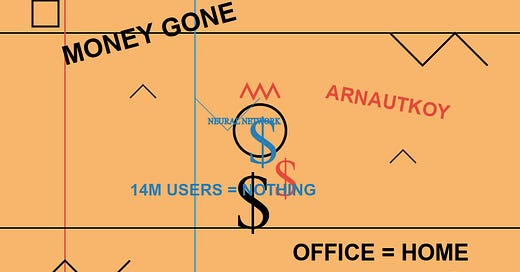Recently one person asked me: "That’s company monies. Why are you so stingy?" they asked. "Just relax and chill."
This is one of those questions that seems naive to anyone who's experienced what I'm about to describe as each person is a neural network trained through their experiences, and some experiences fundamentally rewire how you think about money. That’s may be my problem, but may be my super-power.
So the story, or why I care so much about every dollar in a business.
A multiple years ago, we build a company which one was a mid-success and we got about 14M users. Not a bad exit, not a great, just exit. A bit later, what seemed like a perfect opportunity: my business partner suggested we replicate our successful model in the Turkish market.
The pitch to VCs was straightforward. We had already succeeded with this model once, acquiring millions of users. Now we were just going to do it again in a different market, with different social network, we are going global baby! The VCs knew us from our previous success, and the money came easily.
What followed was a classic example of what I now call the "different market joke." We moved to Turkey, rented a fantastic apartment in Arnavutköy (still one of the most beautiful places I've ever lived), set up an office, and hired a mix of local and remote talent. We built a decent Facebook app, essentially trying to replicate our previous success, signed deals and have a good relationships with Hepsiburada & Markafoni….everything was on a right track.
But markets aren't photocopiers. You can't just reproduce what worked in one place and expect it to work in another. Different culture, different preferences, different mentality. This seems obvious in retrospect, but it's the kind of obvious that only becomes clear after you've burned through significant monies. When sometimes people tell me that I don’t understand the values Researchers or Design bring…Oh dear…
The VCs wanted to see numbers. We didn't have them. The money started running out.
This is where it gets interesting. When you truly believe in what you're building, you don't just give up when the company money runs out. You start using your personal savings. Then your business partner takes out loans. You keep trying to pivot, to find the right angle, to make it work.
But eventually, reality forces your hand. We had to tell most of the office staff we were done. The multi-year office lease couldn't be broken, so we made a decision - moved out of my beautiful apartments and into the office.
The hardest part wasn't living in an office. It was looking at the engineers and designers over the Skype and saying, "I don't have money to pay you right now, but you have my word I'll pay you back. It will take time, but we need two/three more months to try something new."
Those two months didn't save us. There weren't enough users, not enough revenue. After some difficult conversations with my business partner, I bought a ticket back to Moscow. He decided to stay. I had no money, significant debt to the people whom I promised to pay, and no clear plan for paying it back. I sent a Skype message to my best friend: "Hey, Are you in Moscow? Do you have a place to sleep in?"
He met me near his office, bought me a beer and a Mexican burger, and gave me the keys to his apartment. Hey, there are a coach and my new girlfriend → Beers in the fridge…
Eventually, I paid all the debts, and earned enough but scars, scars are there.
So when someone tells me to "just don't care" about people who they hired, or planning to hire, or monies they are spending, these aren't just memories that come back. They're scar tissue.
Every casual "let's just hire them" decision is a potential promise you might not be able to keep, and yes when you work in big-company most of the time this is not your worries and risk are not there…but you are dealing with people, you hire them and that’s mean you are giving them some promise, it’s never ‘just hire’ to me.
Some Afterthoughts:
1. The most expensive words in business aren't "we're investing in growth" or "we're buying market share." The most expensive words are "don't worry."
2. People often mistake financial discipline for stinginess. But there's a difference between being cheap and being careful. Being cheap is about saving money at any cost. Being careful is about understanding that money in a startup is like oxygen during a deep dive: you need to know exactly how much you have and precisely how you're using it.
3. Every dollar in a startup serve a purpose to survive. It's not just currency; it's a tool for keeping promises, maintaining trust, and buying time to figure things out. When you run out of money, you run out of all three simultaneously.
4. As a founder → you should treat company money as it more precious than your own money (because it represents investor trust) and exactly like your own money (because you know that one day it might have to be).
5. Sometimes people need to sleep in their office to truly understand this. I hope you can learn it from my story instead.



